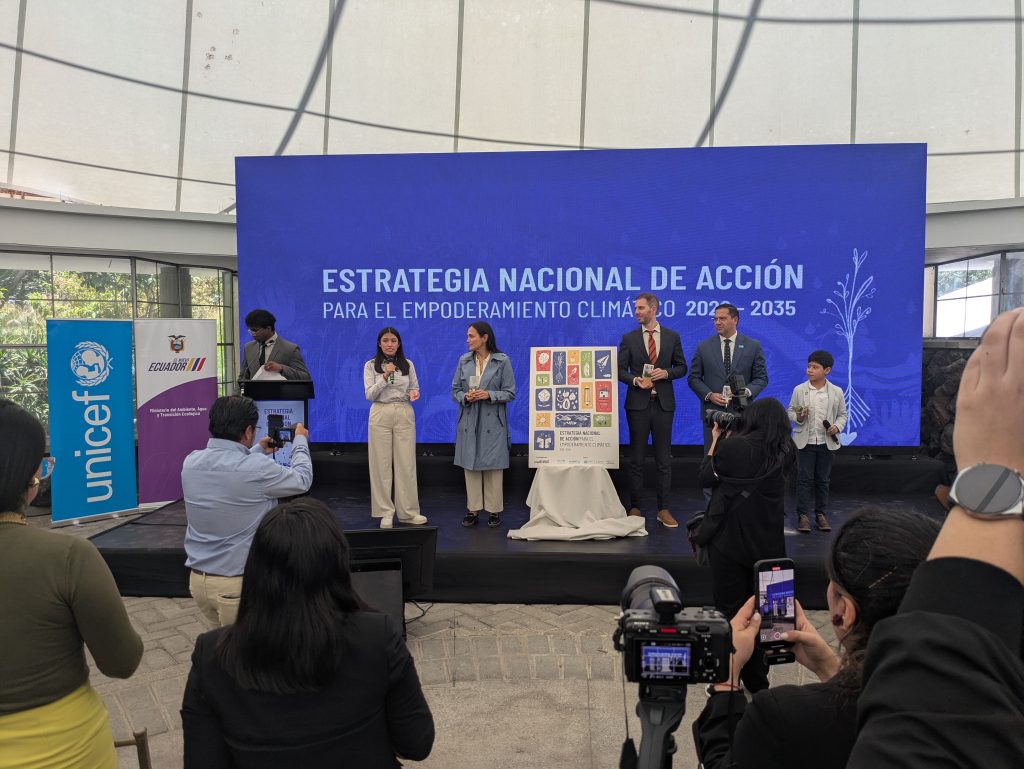The Quito Botanical Garden was the venue for the official presentation of the National Strategy for Action for Climate Empowerment 2026–2035 (ENACE), a milestone in the country’s climate policy aimed at strengthening the capacity of civil society and institutions to adapt to and respond to the impacts of climate change.
The ENACE is the result of a process that began in 2024, with the technical support of the United Nations Institute for Training and Research (UNITAR) and UNICEF and NDC Partnership as strategic partners of the Government of Ecuador, through the Ministry of Environment and Energy. Drawing on its expertise in training, education, and international cooperation, UNITAR directly supported the identification of capacity gaps in climate empowerment, ensuring that the strategy responds to the day-to-day needs of citizens and the country.
The drafting process entailed a participatory approach involving more than 400 national stakeholders, including children, adolescents, young people, indigenous communities, academia, the private sector, public institutions, and civil society organizations. Notably, 62% of participants were women, reaffirming the inclusive and diverse nature of the initiative.

The Minister of Environment and Energy, Inés María Manzano, highlighted in her remarks:
The ENACE is not just a document; it is a climate policy of engagement that reflects the diversity, youth, and capacity of our country to face the great challenges of climate change. Today we reaffirm that climate action is also a social, educational, cultural, and human cause.
From the international cooperation perspective, Giuliano Montanari, UNITAR Regional Coordinator, emphasized:
ENACE is an example of how knowledge, cooperation, and the participation of multiple actors can transform climate action into an inclusive, enabling, and sustainable process. For UNITAR, accompanying Ecuador on this path represents a commitment embraced with conviction.
The event also featured an innovative and cultural component. As part of the presentation, a local artist performed a theatrical monologue, portraying a schoolteacher who explained in a creative and relatable way the importance of ENACE for present and future generations. This performance brought smiles and reflections among attendees, reminding everyone that climate action can also be conveyed through art, education, and emotions.
In addition, a symbolic vow was carried out by the authorities of government institutions directly responsible for implementing the strategy, including the Ministry of Education and the Secretariat for the Intercultural Bilingual Education System, among others. Each institution publicly reaffirmed its responsibility to contribute, within its mandate, to the implementation of ENACE’s six pillars: education, training, awareness, access to information, public participation, and international cooperation.
With this launch, Ecuador reaffirms its commitment to the Paris Agreement and other international instruments such as the Escazú Agreement, to promote a just, inclusive, and sustainable transition. The ENACE represents a national roadmap to ensure that citizens have the knowledge, skills, and tools needed to adapt, reduce risks, and protect the planet, while also balancing economic growth, social well-being, and environmental conservation for present and future generations.
